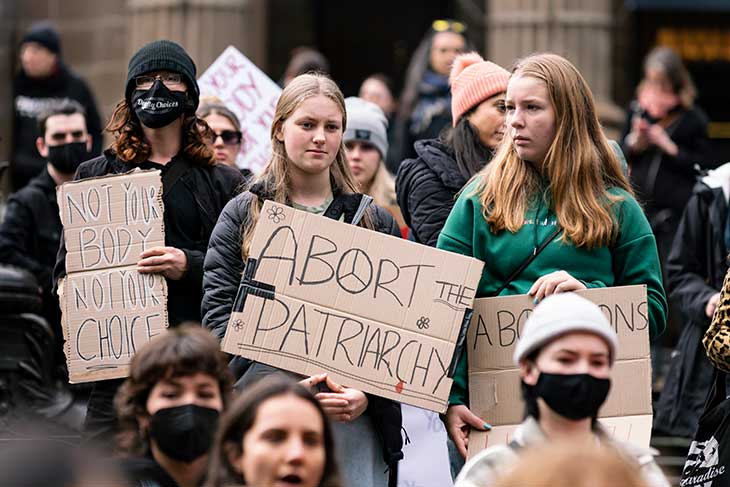
As the 2024 U.S. presidential election approaches, reproductive rights stand as a defining and divisive issue, cutting across age, gender, and political affiliations. This election marks the first since the Supreme Court overturned Roe v. Wade in 2022, eliminating the constitutional right to abortion and thrusting the issue back into the political arena. For Kamala Harris, the Democratic nominee, preserving and restoring these rights is central to her campaign. In stark contrast, former President Donald Trump, the Republican nominee, has left reproductive rights largely to the discretion of states, framing the issue as a settled matter even as he courts conservative voters.
SEXUAL HEALTH
Women across the country have mobilized around Harris’s campaign, with marches and rallies in major cities echoing a resounding call for the preservation of reproductive autonomy. In Washington, D.C., thousands gathered at Freedom Plaza, holding signs that read, “Protect Our Rights” and “My Body, My Vote.” Women from all walks of life, including young students, working mothers, and grandmothers, joined in these demonstrations, united by a shared sense of urgency. In a time when reproductive rights vary dramatically by state, many women see this election as an essential turning point for their futures and the futures of those they love.
For many women, this election represents more than just a decision between two candidates; it is a choice between two very different futures for reproductive rights in America. Harris’s commitment to restoring federal protections for abortion has drawn strong support from women and young voters, who rank reproductive rights as one of their top concerns. Meanwhile, Trump’s campaign remains focused on other policy areas, largely avoiding specifics on reproductive health. His approach has been to reinforce his support for states’ rights in determining abortion policies. The gender divide in this election is stark, with many women siding with Harris on the issue, while a significant number of men favor Trump.
Polls reflect this split, with women, particularly those under 30, overwhelmingly supporting Harris. They view her as a candidate who understands the complexities of reproductive health and respects their autonomy. Trump, however, retains strong support among his conservative base, who see him as a defender of traditional values. His reluctance to discuss abortion directly or offer specific plans has allowed him to avoid alienating moderate conservatives, but it has also left many undecided voters, especially women, wondering about his intentions for reproductive health policies.
@ctvnews The wife of former U.S. president Donald Trump, Melania Trump, released a video promoting her upcoming memoir where she signaled support on abortion rights. #melania #trump #abortion #prochoice #america #politics #ctvnews ♬ original sound – CTVNews
Trump’s rhetoric on protecting women, however, has sparked further debate. Recently, he stated he would “protect women whether they like it or not,” a comment that critics interpret as dismissive and controlling. To many, his remarks appear to trivialize women’s autonomy, raising concerns that his policies could further erode reproductive freedoms. Trump’s approach highlights a fundamental disagreement in this election: who holds the power to make decisions about women’s bodies—women themselves or elected officials?
Beyond the presidential race, abortion rights are also on the ballot in several states where voters will decide directly on measures to either protect or restrict access. For example, Florida, Nebraska, and Arizona are all considering amendments related to abortion, reflecting a broader movement to solidify rights at the state level, where many Republican-led legislatures have passed restrictive abortion laws. These ballot measures are expected to drive turnout, with supporters of Harris and abortion rights seeing them as vital steps to ensuring reproductive freedom.
Harris’s campaign has leaned into the issue, aiming to reach women who may be hesitant to discuss their support openly due to social pressure. Campaign organizers are emphasizing that votes are confidential, encouraging women who feel marginalized to express their beliefs through their ballots. The campaign’s outreach reflects the deepening polarization in the U.S. on abortion and the weight that many women place on the issue as part of their political identity. For many, the vote for Harris is not just about policies but about the message it sends regarding women’s rights and gender equality.
Прикажи ову објаву у апликацији Instagram
Meanwhile, prominent figures are rallying to Harris’s cause, lending their voices to her call for reproductive freedom. In recent weeks, Michelle Obama and former Congresswoman Liz Cheney have spoken out in support of Harris, highlighting how reproductive rights tie into broader themes of freedom and democracy. Cheney’s endorsement is particularly noteworthy given her history as a Republican and her past opposition to abortion. However, she now frames the issue as a matter of government overreach, aligning with Harris on the importance of personal choice.
As the campaign heads into its final stretch, the question remains: will America choose a leader who promises to restore reproductive rights, or one whose policies allow for further restrictions? For millions of voters, particularly women, the choice represents more than just a political preference—it is a stand on the rights and freedoms they want for themselves and future generations.




















sadly people have no idea how important these elections are! Go out and vote